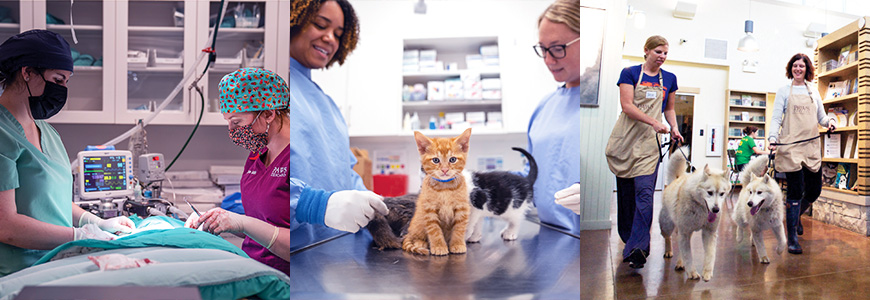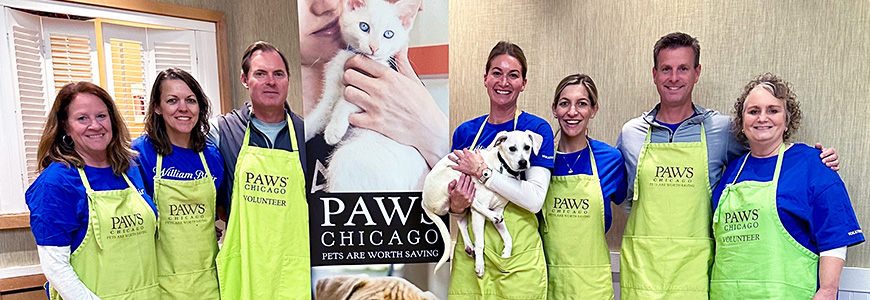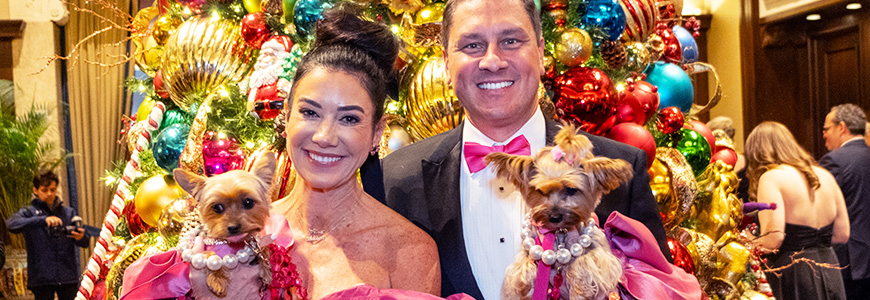In 1997, the year William Blair client PAWS Chicago (Pets Are Worth Saving) was established, more than 42,000 homeless cats and dogs were euthanized in the city of Chicago. At the time, PAWS' Co-founder Alexis Fasseas was a high school volunteer at a private shelter. There, she witnessed the euthanasia of more than 60% of the animals—the vast majority adoptable—in an effort to make more room for new strays. She vividly remembers workers hearing a cat sneeze and promptly putting an “E” on its kennel card for euthanasia.
To save the cats, Alexis took them home—until her mother and PAWS Founder Paula Fasseas stepped in to help.
“I remember saying to my mom, ‘You love animals,’” Alexis said. “‘If those of us who love them don’t do something, who will?’”
To better understand the issues facing homeless pets, Paula traveled to San Francisco to meet with Richard Avanzino, the father of the no-kill movement. Paula also learned that the Chicago city pound was euthanizing 93% of the animals coming in—26,000 of the 28,000 animals at the pound were killed that year.
To better raise awareness about the issue, Paula organized an event, Angels with Tails, which brought animals from the pound to Chicago’s Michigan Avenue to raise awareness in the Chicago community about pet euthanasia. Multiple news stations covered the event, and every animal was adopted. The next day, Paula received 50 calls from people wanting to get involved, motivating the Fasseas family to transition one of its family businesses’ locations into an adoption shelter.

Solving Problems Systemically as a Comprehensive Organization
Using data to drive its initiatives, the Fasseases learned that the key to ending euthanasia was eliminating the oversupply and breeding of unwanted pets and that the origin of pet overpopulation directly correlates to underserved communities. Their first major action item was to open the Medical Center & Lurie Clinic to provide free and low-cost spay/neuter procedures to those who could not otherwise afford it. Using Chicago Animal Care and Control’s birth rate data, PAWS Chicago has helped reduce the rate of euthanasia at its source. PAWS further expanded its reach by opening a state-of-the-art adoption center and the nation’s largest homeless pet hospital.
From a grassroots movement, PAWS has grown into one of the largest no-kill animal welfare organizations in the U.S. Since PAWS’ founding, euthanasia in the city has declined by 90 percent. In 2024, PAWS aided in 4,400 adoptions and over 17,000 surgeries and saw a 98% save rate for animals. They’ve remained committed to serving underserved communities—anyone in Chicago on public assistance can get their animal spayed or neutered for free or low-cost.
“Veterinary care has become unaffordable for many people,” Alexis said. “The inflationary environment has hit pet medical costs at disproportionately high rates. It’s been difficult for people to find veterinary resources, especially affordable care.”
By collecting and studying data, PAWS remains at the forefront of sheltering animals, community engagement, advocacy, and preventing high rates of euthanasia and stray animals in underserved communities. Solving problems systemically allows PAWS to be a fully comprehensive welfare organization.

Elevating the Communities We Serve
From fostering homeless cats and dogs to ensuring spay/neuter procedures are available and affordable to overseeing the pet food pantry, Alexis credited the hardworking volunteers and supporters with being the life force of PAWS Chicago.
Through volunteering with PAWS, William Blair’s Nancy Aversa, CFA, partner, and research analyst, has found a way to connect with her community. During the COVID-19 pandemic, Aversa started gardening with a friend, and her friend would bring a foster dog from PAWS. From there, they began walking dogs together each week at PAWS’ Kocourek Medical Center. This past summer, Aversa joined PAWS’ Development Board and became involved in fundraising and sponsorships.
“Volunteering with PAWS happened organically and was exactly what I needed,” Aversa said. “It ignited something in me and reminded me how much of a passion I have for helping animals.”
Aversa has fostered two dogs through PAWS, Cleo and Gigi, and she adopted Gigi after fostering her. Foster volunteers are a critical part of the journey for many dogs and cats rescued by PAWS. Aversa explained that these animals need a place to feel safe and cared for as they recover from illness or injury.
“It takes a special kind of person to love an animal, create a connection with them, and then let them go,” Aversa said. “While it’s not easy, that process of helping an animal get back to health to have a new life is the greatest gift.”
William Blair Private Wealth Management’s GreenBridge team also saw the community impact of coming together for a focused cause when they volunteered at the Pippen Fasseas Adoption Center. There, they built custom dog food puzzles, restocked food allocations, met and trained some of the animals, and toured the facility.
“Volunteering at PAWS not only brought us closer as a team but also provided an opportunity to reflect on our shared purpose,” said Cam McKinney, partner and wealth advisor. “Inspired by the Nicholas Award, which represents the spirit of elevating others, and the guidance of our Philanthropy Strategy and Community Engagement teams, led by Laura Coy and Nancy Bonges, the GreenBridge team can continue our history of making meaningful contributions.”

Driving Massive Transformation
PAWS Chicago recently held the Fur Ball, a premier pet-friendly event. Guests dressed their pets in formal wear to raise awareness and benefit the organization. Alexis explained that the Fur Ball is one of Chicago’s most important nights for stray animals due to the significant fundraising.
Additionally, PAWS is thrilled to expand into the northwest suburbs of Chicago soon. After exploring different areas, it has identified a 20-acre equestrian center that it will transform into a cutting-edge center for adoption and enrichment. The organization is preparing to launch a capital campaign to build this new suburban center for homeless pets.
By strategically investing in specific communities and animal welfare priorities, Alexis believes they can continuously evolve PAWS’ business model to end the killing of homeless pets and build a truly humane community in Chicago—and beyond.
“Serving animals motivates the heart, inspires us, and keeps us moving forward,” Alexis said. “But at the end of the day, that's not what systemically changes things for them. We have to invest in the root cause and long-term solutions to drive massive transformation.”



